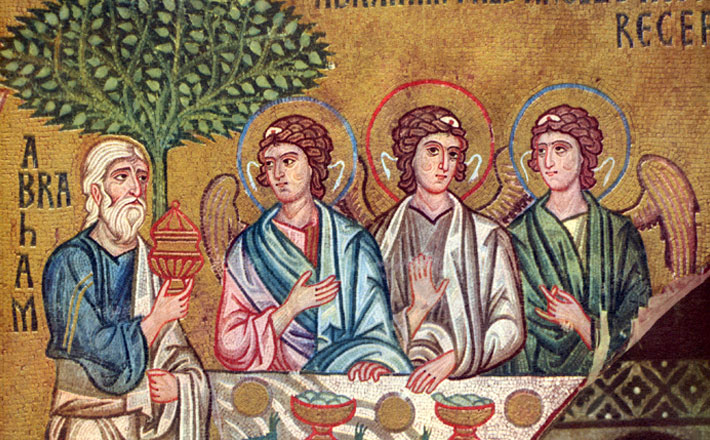Commentary on Colossians 1:15-28
Paul begins this epistle with a typical salutation, identifying first the author and then the community to whom the letter is addressed: “To the saints and faithful brothers and sisters in Christ in Colossae” (Colossians 1:2).
The recipients of this correspondence are first and foremost in Christ. This is their most foundational identity. And we would do well, as preachers, to encourage our communities to embrace their identity in Christ as more crucial than family, race, ethnicity, class, and nationality. But we are always in Christ somewhere. And surely the task of preaching includes addressing the question of what it means to live out a radically Christian identity where we are.
These folks are “in Christ, in Colossae.” And there are two key things to consider when talking about Colossae. The first is that this is a church that meets in the home of Philemon, Apphia and Archippus (Philemon 1-2), from which the slave Onesimus has run away (Colossians 4:9, Philemon 8-21). We need to read Colossians with both Philemon and Onesimus in the room.
Secondly, the socio-economic institution of slavery reminds us that we must read Colossians in the context of the Roman Empire. Indeed, this suggests another hermeneutical principle. Always read scripture in the shadow of empire. And this is nowhere more crucial than in today’s passage.
Having left us gasping for breath from the depth and breadth of his opening run-on sentence, Paul now changes genre and offers a poem of jaw-dropping audacity and sedition (Colossians 1:15-20).
Yes, sedition.
If you read this magnificent poem about Jesus in the context of the Roman imperial imagination you will see that it engenders a seditious imagination.
In a world in which images of Caesar were ubiquitous Paul writes of Jesus as “the image of the invisible God.” (Colossians 1:15)
In an imperial mythology in which the emperor is nothing less than a ‘son of god’ by virtue of his lineage, Paul says that Christ is “the firstborn of all creation” (Colossians 1:15).
In a culture in which the emperor’s preeminence is embedded, legitimated and defended by socio-economic, political, and military structures, Paul has the audacity to proclaim not only that “all things in heaven and on earth were created … through him and for him … ” but specifically that all “thrones,” “dominions,” “rulers,” and “powers” are subject to his rule (Colossians 1:16)! Because of his resurrection, he is the one who will come to “have first place in everything” (Colossians 1:18).
In the face of an ideology that assumes the exceptionality of Rome as a force of good and order against the barbarian, terrorist chaos that lies at the edges of the empire, Paul says that Christ “is before all things, and in him all things hold together” (Colossians 1:17).
The demythologizing of the empire couldn’t be clearer. If Jesus is the image of the invisible God, the firstborn of all creation, then Caesar isn’t. If Jesus is Lord, then the “throne” of Caesar, the “dominion” of the emperor, the “rulers” that keep the imperial order in place, and the very “power” with which they do so, all become subject to the “beloved Son” (Colossians 1:14) to whom this little community in Colossae have pledged their allegiance. And if it all hangs together — indeed, if all of creation hangs together! — in Jesus, then Caesar is a pretentious usurper!
But Paul isn’t finished yet. The sedition is not yet complete.
In an empire that views Rome (or sometimes the emperor himself) as the “head” of the body-politic Paul tells this little community of Jesus followers that Christ “is the head of the body, the church” (Colossians 1:18). Christ, not Rome, not the emperor, is the head, the source, the ruler of the body. But the body isn’t the empire, it is the church! Just as Jesus replaces Caesar, so in this exercise of subversive imagination, does the church (this little community in Colossae and other such marginal communities throughout the empire) replace the empire! I can only imagine how their heads were spinning as they heard this.
Pray that our preaching on this revolutionary poem would engender such a holy sedition in our own time.
And it all happens on a cross.
The Pax Romana was always proclaimed as the great accomplishment of the empire. But we know how Rome maintained the peace, don’t we? On crosses littering the landscape, the peace was established and secured through the eradication of all opposition. So Paul turns the imperial cruelty on its head and says that Jesus achieves his Lordship, demonstrates that he is the one in whom the very fullness of God dwells, and indeed “reconciles to himself all things” by “making peace through the blood of his cross” (Colossians 1:20). Here is a sovereignty, here is a kingdom born of blood, but instead of this being the blood of its victims, it is the blood of its Lord.
It is into such a kingdom that we have been invited in Jesus, and the apostle calls the community to faithfulness (Colossians 1:21-23). Then the apostle pushes the cosmic scope of this kingdom, this reconciliation of “all things” (Colossians 1:20), to its limit when he says that this gospel “has been proclaimed to every creature under heaven” (Colossians 1:23). And he meant it. All of creation has heard the gospel, all of creation recognizes the Redeemer. It is only humans who have a hard time seeing what is before their faces.
And so Paul again makes clear that his intention is to “present everyone mature in Christ.” (Colossians 1:28; cf. 1:9-10)
A seditious maturity that says that if Jesus is Lord then Caesar (and all of his contemporary imitators) is a fraud.
A subversive maturity that knows that subjects of the kingdom are not slaves of the empire.
A holistic maturity that confesses that the scope of redemption is as wide as creation.
A grown-up maturity for the long haul of Christian discipleship in the shadow of empire.


July 17, 2016